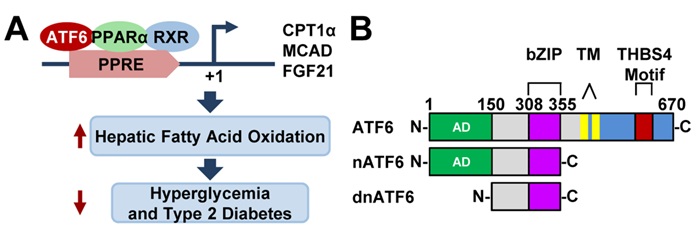
Activating Transcription Factor 6 (ATF6) is a key regulator of the endoplasmic reticulum (ER) quality control protein in mammalian cells. Recently, ATF6 has been revealed as a critical regulator to improve metabolic functions in mice. However, whether and how hepatic ATF6 deficiency affects hepatic lipid metabolism in response to dietary overloading remains largely unknown.
A team of scientists led by Professor LI Yu from the Institute for Nutritional Sciences (INS), Shanghai Institutes for Biological Sciences, CAS demonstrates that the key ER quality control protein ATF6 as an important regulator of hepatic fatty acid oxidation. Mechanistically, they demonstrate that ATF6 stimulates hepatic fatty acid oxidation by direct interaction with peroxisome proliferator–activated receptor α (PPARα). This study supports the notion that ER stress-caused activation of the adaptation and/or recovery unfolded protein response (UPR) pathways such as ATF6 restores lipid dysregulation and maintains metabolic homeostasis.
In this study, scientists utilized gain- and loss-of function approaches to demonstrate that the key UPR sensor ATF6 is sufficient and necessary for hepatic lipid metabolism in mice in response to physiological ER stressors. These in vivo and in vitro studies illustrate that hepatic ATF6-inhibited mice are prone to develop hepatic steatosis during diet-induced obesity and adaptive starvation response. Scientists also reveal that overexpression of dnATF6 or siRNA-mediated knockdown of ATF6 decreases the transcriptional activity of PPARα/RXR complex, and inhibits oxygen consumption rates in hepatocytes. Further studies demonstrate that ATF6 physically interacts with PPARα and enhances the transcriptional activity of PPARα. Moreover, ATF6 enhances hepatic fatty acid oxidation to attenuate hepatic steatosis in diet-induced obese mice through PPARα. Therefore, ATF6-mediated activation of PPARα may represent an alternative avenue to improve liver function and treat hepatic steatosis in obesity.
This work was published online in Diabetes on April 12, 2016, as a research article entitled “Hepatic ATF6 Increases Fatty Acid Oxidation to Attenuate Hepatic Steatosis in Mice through Peroxisome Proliferator-Activated Receptor Alpha”.
This study was funded by the grant from National Natural Science Foundation of China and the Hundred Talents Program of the Chinese Academy of Sciences.

(A) The proposed model for hepatic ATF6 as a novel regulator of PPARα. (B) Schematic structures of full-length ATF6, nATF6 and dnATF6. (Image by Dr. LI Yu’s lab)

86-10-68597521 (day)
86-10-68597289 (night)

52 Sanlihe Rd., Xicheng District,
Beijing, China (100864)

